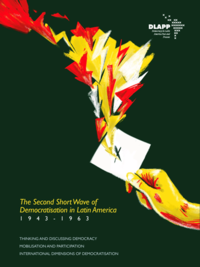A new dossier on the “Second Wave of Democratization” in Latin American has just been published in the Journal of Iberian and Latin American Studies (JILAS), co-edited by four former DPhil students from the History Faculty and the Oxford School of Global and Area Studies: Nicolás Prados Ortiz de Solórzano, Oliver Fletcher, Emilie Brickel-Curryova and Andrés M. Guiot-Isaac. (Prados and Fletcher had previously completed theur MPhil and MSc in Latin American Studies at the LAC).

This collection offers a critical examination of democratisation experiments in Latin America during the mid-twentieth century, a period identified by Samuel Huntington as part of the global “second (short) wave” of democratisation. From 1943 to 1962, thirteen Latin American countries transitioned to democracy, accounting for nearly a third of worldwide regime changes during this era. Despite its historical significance, this “second wave” has not been extensively studied. The new dossier in JILAS addresses this gap by using Huntington’s framework as a starting point, while critically exploring and expanding on it through a multidisciplinary lens.
The dossier's articles investigate the meaning of democracy during this time, how it was implemented, the forces driving its expansion, and its limitations. By doing so, the collection highlights the mid-twentieth century as a crucial period for understanding the history of democracy in Latin America. Considering this “wave” from a global perspective, we might question why democratisation was more successful in Europe during this period, but less so in Latin America, the influence of the Cold War in the tensions between reform and revolution, and how the legacies of this era continue to shape current discussions and perceptions of democracy.
The dossier was developed following the conference “The Second Short Wave of Democratisation in Latin America, 1943-1963” held in June 2021, organized in collaboration with Oxford’s Latin American Centre and The Oxford Research Centre in the Humanities (TORCH).
The articles can be viewed here: https://www.tandfonline.com/toc/cjil20/current.